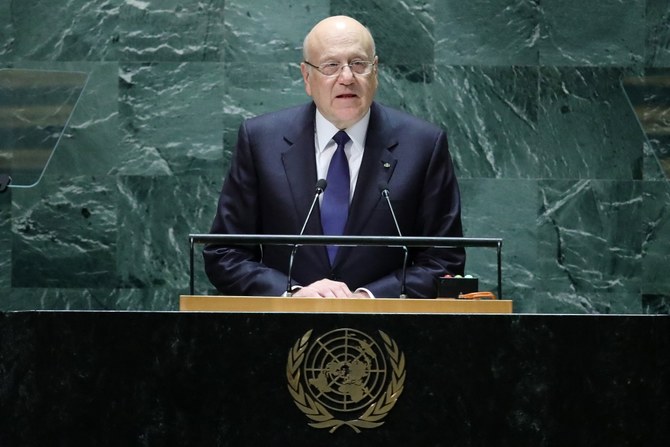
- ARAB NEWS
- 11 Jul 2025

NEW YORK CITY: Lebanon’s political gridlock, the occupation of parts of its territory and the Syrian refugee crisis have led to an “unprecedented economic, financial and humanitarian crisis” that “threatens the very existence” of the country, Prime Minister Najib Mikati has told the UN.
Speaking on Wednesday in the General Debate of the 78th Session of the UN General Assembly, Mikati listed the greatest threats to Lebanon’s stability and prosperity, and called for steps to address his country’s plight.
He highlighted 2023 as marking the 80th anniversary of Lebanon’s independence, adding that over the past eight decades, Lebanon “has been striving to deserve its place among the peace and welfare-loving nations.
“Lebanon was one of the founding fathers of this organization … (and had a) remarkable contribution in the drafting of the Universal Declaration of Human Rights,” Mikati said.
“But it hasn’t always been an easy journey. Besides the bright chapters of stability, growth, prosperity and peace building, Lebanon has also known long and extremely difficult phases.”
The Lebanese PM, who was designated to fill the role in 2021, said that his country is facing “numerous, overlapping crises” that come “against the backdrop of a weakened international system and regional climate full of questions and challenges.”
Those challenges “weigh heavily” on the Lebanese people, Mikati said.
The first major challenge is the vacant position of president of the Lebanese republic, he added.
The political gridlock in Beirut had led to institutional instability and an exacerbation of Lebanon’s economic and financial woes, said Mikati, who added that structural reforms, which the people “depend on to save the country,” cannot be launched.
He commended the role of the five-nation group on Lebanon, which includes Saudi Arabia, as well as France’s efforts aimed at resolving the crisis.
“I sincerely look forward to the Lebanese Parliament exercising its sovereign role by electing a president of the republic in the coming period,” Mikati said.
That would see Lebanon “returning to fulfil its mission and playing a leading role in close cooperation with our Arab brethren and our friends in the international community,” he added.
Mikati said that the 12 years of displacement in Syria as a result of the country’s civil war is “threatening Lebanon’s very existence.”
Per capita, Lebanon hosts the highest number of refugees in the world.
The international community’s response to the issue is “timid” and falls short of an effective, sustainable solution, Mikati said, adding that Lebanon has repeatedly voiced its concerns in the international arena.
“Lebanon will not be the only victim,” he warned, calling for the international community to take action on the displacement of Syria’s people.
But Mikati highlighted a “positive development,” saying that Lebanon had “reached an agreement with the UNHCR on the exchange of information pertaining to the Syrian presence in Lebanon.”
The PM said that his country’s third major challenge concerned Israel’s continued occupation of Lebanese territory in the south as well as Tel Aviv’s “ongoing aggressions and violations.”
Rising levels of political insecurity and instability in the Middle East are “casting a shadow over the countries of the region and their peoples,” Mikati said.
But he hailed two recent steps toward rapprochement in the region: the return of Syria to the Arab League and the signing of the Saudi Arabia-Iran deal.
He added: “I would like to express our solidarity with the Libyan and Moroccan peoples in the aftermath of the natural disasters, which ravaged the two countries.”
Mikati said that despite the situation in Lebanon, his country is implementing the 2030 Sustainable Development Goals and aiming to meet the targets of the Paris Climate Agreement.
He hailed Egypt’s hosting of COP27 and said that Lebanon looked forward to taking part in COP28 in the UAE later this year.
Mikati ended his speech by calling for a “sovereign and independent Lebanese state; a strong, able and inclusive state cooperating with the international community, and friendly and brotherly countries.”
“A Lebanese state that protects the parliamentary democratic system, and public and private freedoms; that engages in structural reforms and in strengthening the rule of law, citizenship, accountability and justice.
“A Lebanese state of peace, tolerance and brotherly relations that adopts a policy of dissociation and stays away from the policy of axes.
“A Lebanese state which is an urgent need for security peace, stability and prosperity in the region.”